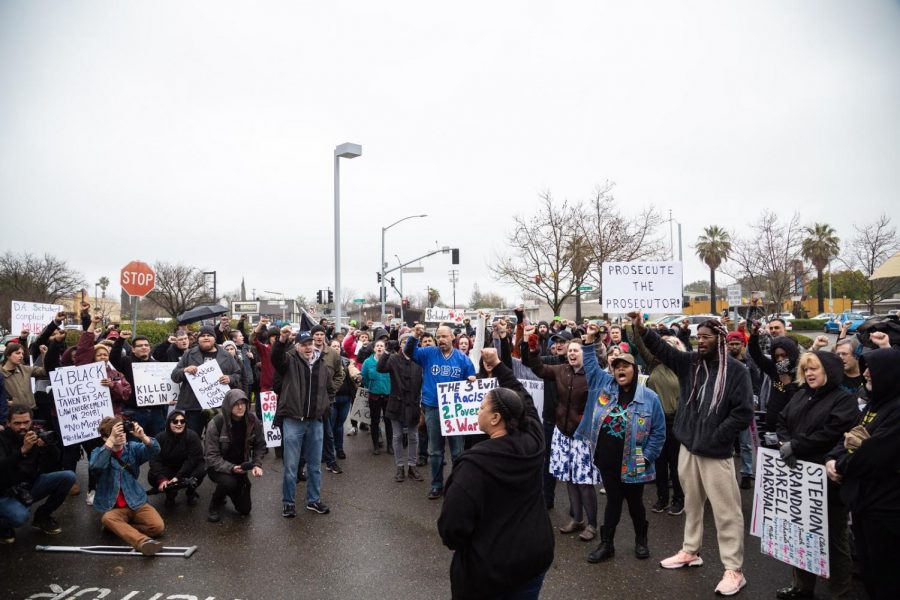OPINION: Stephon Clark’s killers weren’t charged. What happens next?
Eucario Calderon – The State Hornet
Tanya Faison, Sacramento’s Chapter Leader for Black Lives Matter chants with group of protestors “It is our duty to fight for our freedom. It Is our duty to win. We must love and support one another. We have nothing to loose but our chains,” on March 2 outside the Sacramento Police Department headquarters.
March 15, 2019
It’s been nearly a year since the murder of 22-year-old Stephon Clark, an unarmed black man who was gunned down by two Sacramento Police Department officers in his grandmother’s backyard.
Since his death on March 18, 2018, the two officers who fatally shot Clark — Terrence Mercadal and Jared Robinet — were the center of an investigation into whether they should be criminally charged.
In an unsurprising move, Sacramento County District Attorney Anne Marie Schubert announced Saturday that Mercadal and Robinet would not face criminal charges.
With an increase in the attention being given to African-Americans being shot by the police, like the 2012 fatal shooting of unarmed 17-year-old Trayvon Martin and 2014 fatal shooting of unarmed 18-year-old Mike Brown, most court systems rarely hold the police accountable for their actions. The verdict repeats itself and I have become used to seeing those who are wrongfully shot not receive any justice at all.
After a while, it becomes expected and repetitious.
RELATED: No charges filed against officers who shot and killed Stephon Clark
During the announcement Saturday, Schubert brought up Clark’s criminal record, domestic issues and internet history prior to the shooting, and used it as an indirect way to justify his death.
Clark’s toxicology report also showed a variety of drugs in his system, which included alcohol, Xanax, codeine, hydrocodone, marijuana and cocaine metabolite.
What is the relevancy? Whatever he was doing or had done prior to the shooting has a zilch of pertinence as to why he was shot. Bringing up his past only smeared his image, making it seem acceptable for people who are struggling with criminal records or substance abuse to be gunned down.
In line with Schubert’s decision, California Attorney General Xavier Becerra announced Tuesday he will not file criminal charges against Robinet and Mercadal.
RELATED: ‘Stand up, fight back’: Sacramento reacts to Stephon Clark decision
Schubert’s decision, along with Beccera’s and the community’s response, have struck me with confusion. There is no doubt in my mind that the two officers should have faced some kind of charge, but my confusion doesn’t lie there.
What I am confused about is this: Where do we go next? How does a community heal after experiencing so many injustices? And is a person’s past a worthy determiner of justice, especially a person who has been killed?
Tragedies such as Clark’s bring communities together, but once the hype dies, the harmony that was strongly thriving eventually withers away. People must return to their daily lives and put their energy back into their responsibilities.
How do we take the strength and energy and make it last? The conflict underserved communities face is consistent. In times like these, the rallying and roaring for justice must echo into the days that are forthcoming.
A man lost his life, and regardless of his past or condition prior to his death, those should not be used as reasons to justify what happened. The DA’s decision says more about Sacramento law enforcement’s inability to consider Clark’s condition as a human, and its’ failure to apply the necessary steps of justice.
The decision is blatantly weak, thin, and shallow. What will become of our justice system if cases like Clark’s continue to be dismissed, overlooked and justified off poor choices done in the past? Only time will tell.

































































































































